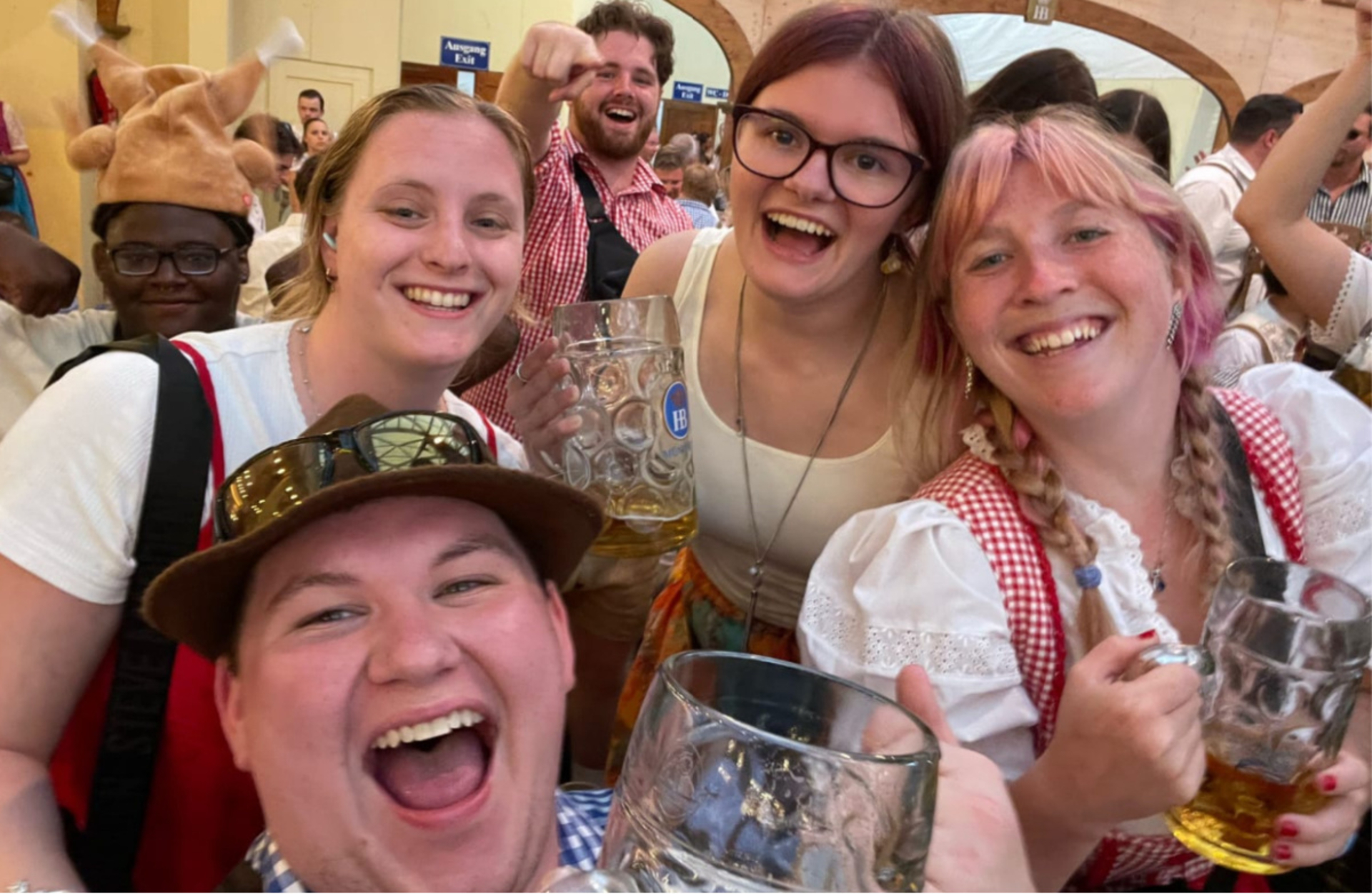
What happens when Guilford students get lost during study abroad for four months? They find themselves.
When 11 Guilford College students arrived in Munich this fall, the city was still warm enough for open windows and evening walks. They found themselves in tidy apartments above bakeries, in narrow streets that smelled faintly of coffee and rain. They are here for a semester-long study abroad program led by Professor David Limburg, a man who has spent decades showing students that learning another language is really about learning to listen.
“This program changes lives,” David says. “And not just because they see Germany differently. They come home seeing their own country, and themselves, differently too.”
The program – one of the oldest of its kind in the country – has a simple structure that quickly grows complicated. Each of the 11 students takes four classes, lives with a host family, and learns to move through Munich like a local. Only one of this year’s eight host families is fully German. The rest are from Mexico, Turkey, Cameroon and Egypt. “They’re experiencing multicultural Germany,” David says. “The Germany that actually exists.”
One of those students is Shelby Kayea ’27, who is double majoring in Criminal Justice and Forensic Biology. She is not a German major, not even close. Before Germany, the North Augusta, S.C., resident had never left the country.
The transition from Guilford to Germany was an anxious one, she admits. “I was really scared that I’d want to go home immediately,” she says. “But once I got here and settled in, it was thrilling. Everything was new — the food, the people, even the way the buses ran. I didn’t have time to ease into it. I just hit the ground running.”
Shelby starts her mornings with a train ride and ends some nights under the yellow lights of Marienplatz, a central square in Munich. Her classes — Migration into Germany, Political Science, German 101, and David’s Immersion Seminar — spill out into the city itself. Twice a week, he meets the group somewhere unexpected: a museum, a train station, a soccer stadium. “Sometimes he just gives us a stop name,” Shelby says. “It’s part language lesson, part scavenger hunt.”
Guilford’s study abroad programs are not all work and no play — though it can sometimes be difficult telling the two apart. A few weeks ago, Shelby stood on a cable car gliding over snow at Zugspitze, Germany’s highest mountain. “It was freezing and kind of freaky,” she says, “but the view was worth every second.” Another night she wandered Munich’s museums until 1 am, part of an event called Night of the Museum, where students pay a few euros to roam the city’s galleries after hours.
The moments accumulate quietly — standing in line for bread, finding her way on the S-Bahn, learning the rhythms of a new city. “As Americans, we definitely notice differences,” she says. “From my criminal justice perspective, I see how effective some of their systems are — like public transportation or community planning. There’s so much intention in the way things are done here. It makes you wonder what we could do differently back home.”
That kind of reflection is what David wants most. “They learn independence, adaptability, confidence,” he says. “They see the world through a bigger lens.”
To teach that, he has a small ritual. He hands out a map, gives an address, and says: “Find me — without your phone.” The students always do. “Usually right when the coffee’s still warm,” he says, smiling.
The program’s home base is the AEV, a Turkish-German community center that has hosted Guilford students for decades. On Thursday nights, everyone gathers for Stammtisch, a German-style dinner where the rule is simple: no English. “No grades, no pressure,” David says. “Just talk.”
Joseph Lambert ’26 is a Modern Language Studies major from Durham, N.C., with a track in German. This is his second study abroad to Munich. He hopes to one day work for a German auto manufacturer like BMW or Volkswagen and says a semester abroad helps him absorb the country’s culture and language. “You’re around German people every day so there’s always an opportunity to practice your German,” he says. “And around every corner there’s so many opportunities to learn about the culture.”
Half the group arrived with no knowledge of German. Now, six weeks in, they’re ordering food, singing songs, chatting with host parents. Shelby says it’s not just about language — it’s about learning to connect. “I used to think being independent meant being isolated,” she says. “Now I feel independent but not alone. I’ve learned to ask for help. To talk to people.”
Last week Shelby was preparing for a weekend in Paris with a friend for their 21st birthday. “We’re going to see the Eiffel Tower and a few museums,” she says, smiling, already halfway there in her mind. Next up: a trip to Berlin.
For Shelby — and for the 10 other Guilford students — Munich has become something between a classroom and a mirror. They are learning to see themselves reflected in another culture, to navigate uncertainty, to realize that independence is not about distance, but understanding.
When they return to Greensboro, they’ll bring back more than souvenirs or credits. They’ll bring back a different way of seeing the world — and a little of the world’s way of seeing them. If you're looking for a college that will change you and your view of the world, contact Steve Mencarini at Guilford College.

